"There is definitely an emerging market for CEA as a farm diversification strategy, similar to the previously established urban model of selling locally to restaurants and other businesses. Options range from higher-tech containerized systems to simpler setups, like single-level hydroponic polytunnels. With suppliers across various levels of technology in our network, UKUAT is well-positioned to address this growing interest," says Mark Horler, Founder and chair of UKUAT.
The UK Agritech sector has seen a sprightly week with agtech-related events. All the way to Birmingham (Farm Business Innovation) and Warwick (Biomass Connect event at Warwick University), to Essex (AgriTech Week by AgriTechE) the indoor farming sector was out and about, spreading word on the potential impact of its cultivation methods across and beyond the UK.
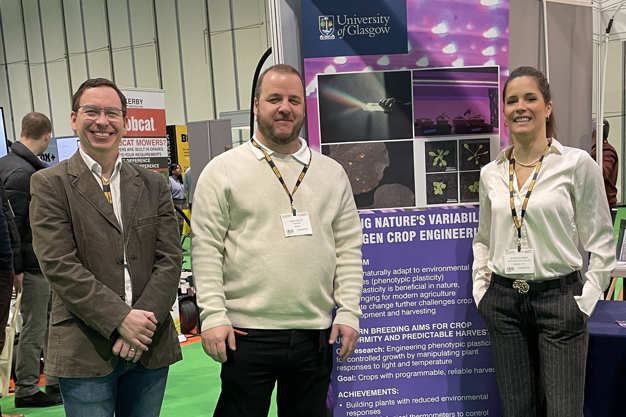 Dr Matt Jones from the University of Glasgow together with the UKUAT team, with Mark Horler, and Katia Zacharaki
Dr Matt Jones from the University of Glasgow together with the UKUAT team, with Mark Horler, and Katia Zacharaki
Farm Business Innovation event: Increasing interest in CEA opportunities
Amongst one of the participants was the UKUAT, which saw opportunities for members to introduce their CEA solutions at the Farm Business Innovation (FBI) show, showcasing the possibilities of CEA to farmers that may want to diversify their activities.
"Exploring what CEA is and how they could collaborate with universities and suppliers offering and potentially supply off-season crops by adding indoor cultivations to their business model. A low-key event that looks at the potential of hybrid cultivation for discussion without obligation," Mark explains.
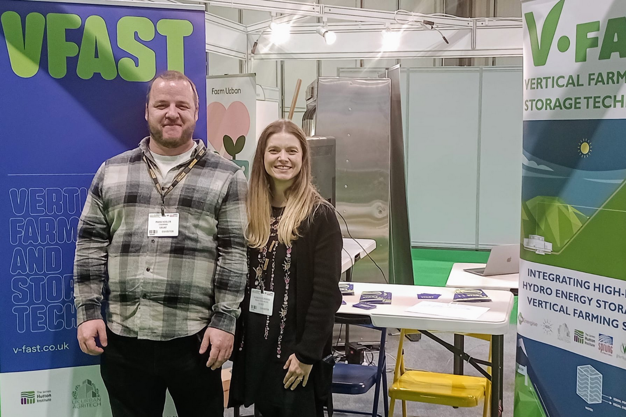 Mark Horler and Alana Kluczkovski
Mark Horler and Alana Kluczkovski
Together with members, the UKUAT exhibited at the V-Fast stand, a consortium project funded by Innovate UK exploring the combination of renewable energy, novel energy storage, and vertical farming represented by DR Alana Kluczkovski.
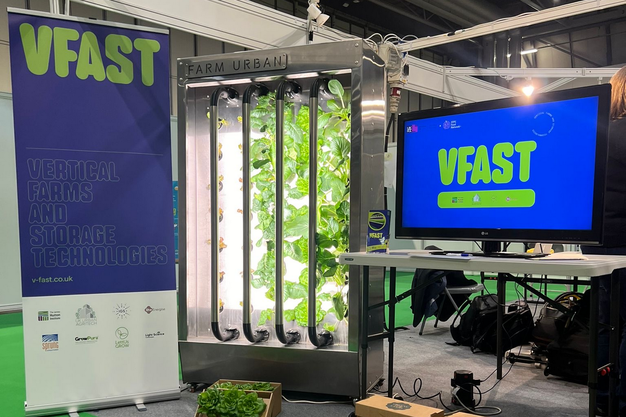 The FarmUrban stand
The FarmUrban stand
Another company sharing the stand space was Farm Urban, a vertical farming company based in Liverpool, targeting B2B and schools, represented by Dr Paul Myers, Sebastian Linares.
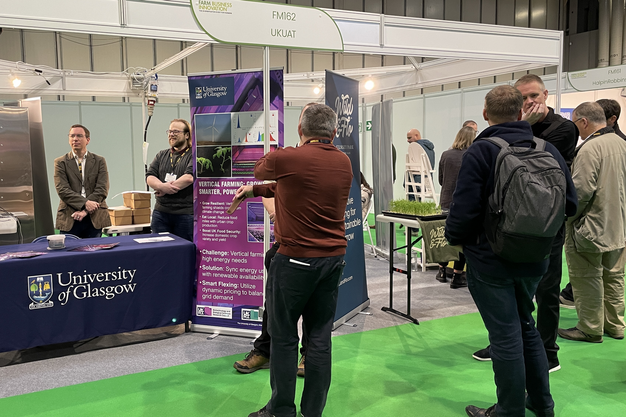 The University of Glasgow stand
The University of Glasgow stand
Represented by Dr. Matt Jones and Dr. Martin Battle, the University of Glasgow was also present at the show. The two researchers are looking into lighting and temperatures for various crops, interested in vertical farming with basil as their primary crop of interest.
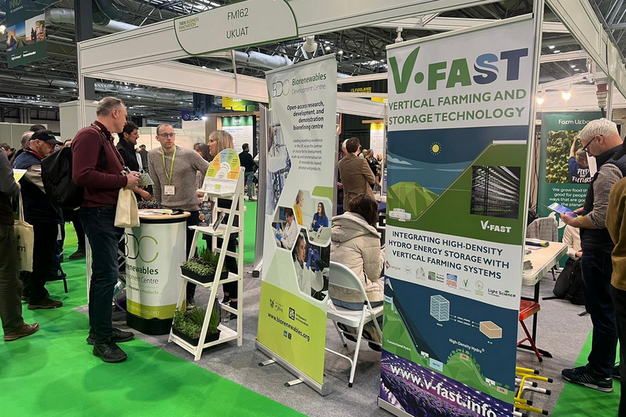
The stand of the Biorenewables Development Centre
The Biorenewables Development Centre, with Anna Alessi and Christopher Hunt present. The Centre is a spinoff of York University, who was also part of the stand, interested in collaborations in new projects where their unique skills and laboratory capabilities could be utilized, potentially in publicly or privately funded projects.
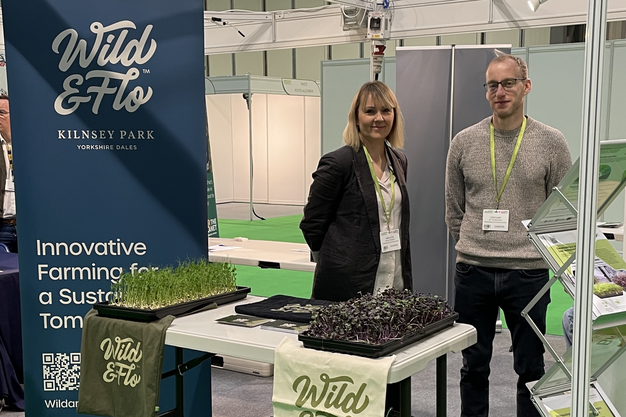 Last but not least, Wild&Flo with Lewis Adams and Jamie Roberts. Wild&Flo is a startup microgreens producer
Last but not least, Wild&Flo with Lewis Adams and Jamie Roberts. Wild&Flo is a startup microgreens producer
For all exhibitors of the UKUAT stand, the main aim of the event is to grab farmers a their very early stage of CEA exploration. Not everyone knows what CEA is at the most basic, but the most interest from attendees was in how they can utilize technology to diversify their farm revenue streams, whilst also ensuring an appropriate business model that is financially viable.
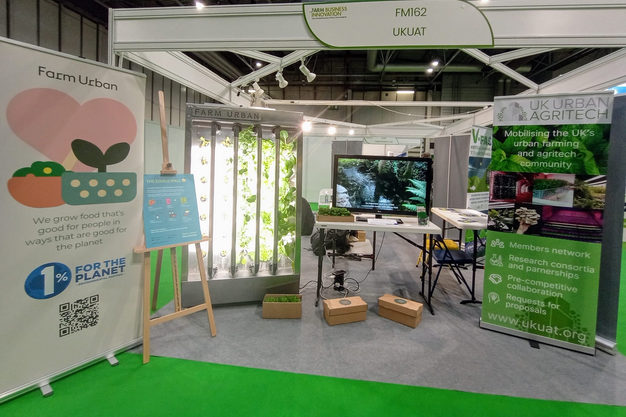
Reflecting on the Farm Business Innovation Show, Mark Horler explained that the event was a great opportunity for (UKUAT) members to showcase their work and discuss with farmers what CEA is all about. "Farms are having a tough time right now, and the recent UK government budget has crystallized for many farmers and landowners that diversification is essential for long term viability. Farmers were really impressed and interested in our stand, asking questions about how they could engage with the sector," he adds.
AgriTech Week
At the same time, AgriTechE organized its 11th Agritech week. The Agri-Tech Week (ATW) is an annual partnership initiative coordinated by AgriTechE to showcase excellence in UK agri-tech, foster new collaborations, and attract new audiences, customers, and partners to the UK agri-tech ecosystem.
This was the 11th edition of the event, which provided a unique opportunity to connect with the industry players driving the latest scientific advancements and innovations. On top of that, the event organized a tour, introducing indoor farming to event partakers. "The week highlighted exciting developments in agri-tech through a vibrant mix of events, workshops, farm visits, and, notably, the Agri-TechE REAP conference."
Agri-Tech Week showcased several vertical farming activities aimed at advancing sustainable food production, through farm and R&D lab visits, panels and more.
"It is impressive to see so many advancements in the field of CEA, from software engineering to fundamental plant science, emerging within the research community. Events like this provide researchers and scientists with valuable opportunities to share their work, spark new ideas, and foster partnerships for future projects and collaborations. It's essential to keep innovation aligned with commercial objectives and relevant to end users," shared Katia Kouloumprouka-Zacharaki, Communications Director at UKUAT and TCEA Specialist at Niab, as she attended the November 7th events at the University of Essex.
Biomass connect
The last event of this week was the biomass connect showcase which was help at the University of Warwick with title: Harnessing Innovation.
The Future of Biomass took place over two dynamic days, offering attendees a wealth of talks, demonstrations, presentations, and informational exhibits. Biomass innovators shared their experiences and perspectives on the future of the industry, while participants had valuable opportunities to network with key industry stakeholders. The event fostered collaborative discussions on shaping the role of UK-produced biomass in the drive toward net-zero. Meals and overnight accommodation were provided at The Slate on November 7th, enhancing the overall experience for all who attended.
In this event, while it seems much different that vertical farming we have a project called TAEDA Tech Technologies, which is looking in the propagation of willow (Salix spp) using aeroponics, aiming to support the transition of the UK into sustainable biomass. The £4M project is funded by the Department of Energy Security and Net Zero (DESNZ), and led by the Centre for Environment and Sustainability at the University of Surrey.
At the event, Dr. Zoe Harris was presenting about the latest development and the progress of the TEADA project. The project adopts aeroponics to fast-track the sustainable propagation of SRC willow. Zoe is the principal investigator on the project and Senior Lecturer in Environment and Sustainability at University of Surrey.

UK Urban AgriTech
[email protected]
www.ukuat.org
